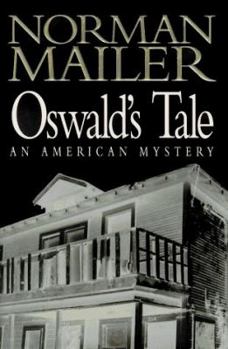Oswald's Tale:: An American Mystery
Select Format
Select Condition 
Book Overview
In perhaps his most important literary feat, Norman Mailer fashions an unprecedented portrait of one of the great villains--and enigmas--in United States history. Here is Lee Harvey Oswald--his family... This description may be from another edition of this product.
Format:Hardcover
Language:English
ISBN:0679425357
ISBN13:9780679425359
Release Date:April 1995
Publisher:Random House (NY)
Length:791 Pages
Weight:2.50 lbs.
Dimensions:1.7" x 6.5" x 9.6"
Customer Reviews
5 ratings
Maladjusted
Published by Thriftbooks.com User , 15 years ago
This work by Norman Mailer relies in part on newly released KGB tapes of the Oswald surveillance. As is well known, Oswald sought to renounce his U.S. citizenship and then wanted to reclaim it and a valid passport to return to the U.S. with his new wife, Marina. It is surmised that the interest of the security agencies was triggered by Oswald's lack of a reasonable motive as the basis for his conduct. (This lack of motive, this seeming unreason, goes all the way through the Oswald saga to its conclusion of murder and counter-murder.) Like Gary Gilmore, EXECUTIONER'S SONG, Mailer has a sort of existential anti-hero in his sights. His use of documentary sources to fill out his imaginative recreation of events is both bold and appropriate. This book approaches the mastery of material pertaining to a troubled loner versus officaldom shown in EXECUTIONER'S SONG. The description of the KGB officer in charge of Oswald's case, his work schedule, his temerament, his family, is of great interest. Too, transcripts detailing the couple's interactions thicken the book's texture. Interspersed are the testimony and explanations of Oswald family members of the lives of Marina and Lee Harvey Oswald as given to the Warren Commission. Mailer says that one impetus to writing the book was the availability of material from the Belarus KGB. Oswald's going to the Soviet Union as a Marine was astonishing because, Mailer opines, Marines do not defect. In Russia, torturing his vanity, Oswald was anonymous. Mailer is good at disclosing the mutually paranoid views of the super powers of the Oswald story. In addition to official sources, Mailer uses the work of authors Epstein, Posner, and McMillan. The result is excellent, a feast.
Maladjusted
Published by Thriftbooks.com User , 15 years ago
This work by Norman Mailer relies in part on newly released KGB tapes of the Oswald surveillance. As is well known, Oswald sought to renounce his U.S. citizenship and then wanted to reclaim it and a valid passport to return to the U.S. with his new wife, Marina. It is surmised that the interest of the security agencies was triggered by Oswald's lack of a reasonable motive as the basis for his conduct. (This lack of motive, this seeming unreason, goes all the way through the Oswald saga to its conclusion of murder and counter-murder.) Like Gary Gilmore, EXECUTIONER'S SONG, Mailer has a sort of existential anti-hero in his sights. His use of documentary sources to fill out his imaginative recreation of events is both bold and appropriate. This book approaches the mastery of material pertaining to a troubled loner versus officaldom shown in EXECUTIONER'S SONG. The description of the KGB officer in charge of Oswald's case, his work schedule, his temperament, his family, is of great interest. Too, transcripts detailing the couple's interactions thicken the book's texture. Interspersed are the testimony and explanations of Oswald family members of the lives of Marina and Lee Harvey Oswald as given to the Warren Commission. Mailer says that one impetus to writing the book was the availability of material from the Belarus KGB. Oswald's going to the Soviet Union as a Marine was astonishing because, Mailer opines, Marines do not defect. In Russia, torturing his vanity, Oswald was anonymous. Mailer is good at disclosing the mutually paranoid views of the super powers of the Oswald story. In addition to official sources, Mailer uses the work of authors Epstein, Posner, and McMillan. The result is excellent, a feast.
Oswald's War Against All
Published by Thriftbooks.com User , 17 years ago
Long as it was I regretted reaching the end of this book. Oswald's Tale purports to be a work of fiction. In fact, it impossible not to appreciate the wealth of research and analysis that informs the pages of this dense text. It becomes increasingly clear that Oswald very likely acted alone. Indeed, this is only a question because of the tributaries of zealots that seemed to work on the fringes of formal organizations, including the FBI and the MAFIA and so on. Yet, Oswald very likely acted independently; it would have been practically impossible for any one organization to control him. The novel Libra had it very nearly correct with its assessment that, had Oswald be chosen, it would very likely have been because he could have been depended upon to miss his target, or otherwise bungle the job. No one but Oswald propeled himself onto to the stage of Cold War history. In Oswald's world, his sense of destiny was confirmed by the chance occurrence of being employed in the Texas Book Depository in Dallas, stationed along the very route that President Kennedy's motorcade took that day in November. In addition to the quality of the writing and analysis, the book is to be commended for focusing so intently on Oswald's marriage to Marina, and the relationship he had with his mother, Margueritte. Like so many tragedies, one is all too easily reminded of Shakespeare's Richard, "my kingdom for a horse." Had Cuba provided Oswad a visa enabling him, ultimately to return to the Soviet Union he had already abandoned, history might well have taken a different course. Instead, Oswald's dyslexia, his sense of greatness, his determination and his lack of abilities in so many areas coupled with his gifts in others: all conspired, with chance playing its part, to place Oswald in the book depository from which he assasinated President Kennedy and subsequently murdered Dallas PD Officer Tippit.
Probing the mind of Oswald
Published by Thriftbooks.com User , 18 years ago
Norman Mailer's book does not resolve the question of the existence of a conspiracy in JFK's assassination (for that see The Man Who Knew Too Much by Dick Russell), but it does provide critical pieces of information about Oswald's psyche that help us assess the liklihood that Oswald was involved in the assassination. For that reason I highly recommend this book. Mailer provides interesting and frequently relevant detail about Oswald's life with Marina in Russia and their lives back in the US after they moved from Russia. The portrait that emerges of Oswald is one that is crucial to understanding what happened to JFK. Mailer provides convincing evidence that Oswald's activities were largely, if not completely, based on his own agenda and psychological makeup. It is highly unlikely that he was anyone's agent while living in Russia. Most important is the information about Oswald's desire to live in Cuba after his return to the US from Russia--this was his personal agenda in mid-1963. Mailer takes us that far. Dick Russell's The Man Who Knew Too Much fills in the missing pieces. Russell's book shows that this agenda of Oswald made him vulnerable to a ploy to enlist him in the conspiracy. Mailer's book on the psychological makeup of Oswald combined with Russell's book on how that makeup was manipulated solves the case.
Oswald's "long and determined dream of high destiny."
Published by Thriftbooks.com User , 18 years ago
Mailer's "non-fiction novel" of Lee Harvey Oswald is stunning, not just for the new information he has uncovered about Oswald's life in Russia between 1959 and 1961, but because Mailer has ordered this information to provide true insight into Oswald's psyche. At nineteen and just out of the Marines when he flew to Moscow, Oswald intended to apply for Soviet citizenship, believing that Marxism was "purer" than capitalism. Remaining in the USSR for two and a half years, he married Marina and fathered a child before becoming disillusioned with his poverty and deciding to return to the US. In the USSR, Oswald was under constant KGB surveillance, and Mailer's first-ever access to the KGB files and his effective use of them give the reader a sense of who Oswald was between the ages of twenty and twenty-two. All the everyday aspects of his life, his constant fights with Marina (and his eventual physical abuse of her), his belief that he is meant for "high destiny," and his inability to find success and purpose in his Russian life, despite his high ideals, show a young man frustrated in every aspect of life. Using files from the KGB, Warren Commission, the House Select Committee on Assassinations, and books written about Oswald by Gerald Posner, Priscilla McMillan, Jim Marr, and Carl Oglesby, Mailer presents an astounding amount of historical data. Keeping his prose style journalistic and factual, Mailer uses his talents as a Hollywood script-writer to create dramatic dialogues appropriate to the facts, bringing events to life and making this long novel move quickly. Making frequent use of flashbacks, he fills in background detail, recreating Oswald's life as a young boy in New York--his truancy, his assignment to a youth center (where he was picked on), his relationship with his overbearing mother, and his constant loneliness. When Oswald returns to Dallas in 1963 with his wife and daughter, he still has dreams, still sees himself as "an instrument of history," and is still frustrated and unhappy. His claim of responsibility for the April, 1963, assassination attempt on Gen. Edwin Walker, a John Birch Society supporter, whether or not it is true, shows him acting out his belief that he is an instrument of history in the months leading up to Nov. 22, 1963. Six months after the assassination attempt on Walker, Oswald takes advantage of the accident of history that has brought the JFK motorcade past the window of the Depository where he works, and he acts out his self-declared destiny. Presenting all the information available to him, Mailer maintains a balanced point of view. Though he mentions contacts Oswald made with the FBI, his attempt to go to Cuba, Mafia attempts to kill Castro, and Oswald's strange connection with Baron George De Mohrenschildt, a Russian emigre with some CIA ties, he draws no conclusions due to lack of evidence, leaving those to the reader. This fine novel organizes mountains of raw material, some of it new, to pr
Oswald's Tale: An American Mystery Mentions in Our Blog

The Joy of Book Gifting
Published by Ashly Moore Sheldon • November 03, 2024
Here at Thriftbooks, we spend a lot of time thinking about the kinds of books our customers will enjoy. During the holidays, that extends to the books our customers would most like to give (and receive) as gifts. Our newest poll looks at book gifting trends. Here are some of the compelling stories we unwrapped.






